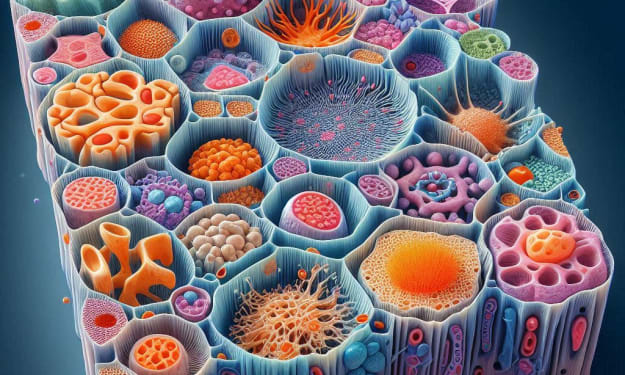Skin Deep: Unveiling the Wonders of Your Living Ecosystem
Unlocking the Secrets of Your Skin & Cultivating Lifelong Health

Our skin, the largest and most complex organ we possess, is more than just a pretty surface. It's a dynamic, living ecosystem teeming with trillions of microscopic organisms and constantly working to protect us from the outside world. From safeguarding us against harmful rays to regulating temperature and even synthesizing essential vitamins, healthy skin is the foundation of overall well-being.
Why Should Your Skin Matter? Understanding Its Vital Functions
Imagine your skin as a superhero shielding you from countless dangers. Here's a glimpse into its impressive list of superpowers:
- Guardian Against External Threats: Skin acts as a physical barrier, blocking harmful UV rays, bacteria, viruses, and pollutants from entering our bodies.
- Thermoregulation Champion: By regulating sweat production and blood flow, skin helps us maintain a constant internal temperature, keeping us cool in hot weather and warm when it's cold.
- The Vitamin D Factory: Exposure to sunlight triggers vitamin D synthesis in the skin, vital for bone health, immune function, and even mood regulation.
- Sensory Wonderland: A network of nerve endings throughout the skin allows us to feel a vast array of sensations, from the gentle caress of a loved one to the prick of a pin.
- Nonverbal Communicator: Changes in skin color (like blushing) and sweating convey emotions and social cues, playing a crucial role in social interaction.
- Nutrient Reservoir: The deepest layer of skin, the hypodermis, stores fat, which serves as an energy reserve and provides insulation for our internal organs.
Beyond the Surface: Unveiling the Layers of Your Skin
Our skin is a masterpiece of intricate organization, with each layer playing a specific role. Let's delve deeper and explore these fascinating layers:
- The Epidermis (Outermost Layer): This constantly renewing layer is the body's first line of defense. Composed primarily of keratinocytes, which produce the protein keratin (skin's main building block), the epidermis also houses pigment-producing melanocytes and immune cells. The epidermis is further subdivided into distinct sublayers, each with specific functions in cell production and barrier formation.
- The Dermis (Middle Layer): The strong and elastic dermis provides structural support and houses blood vessels, nerves, hair follicles, sweat glands, and sebaceous glands. Collagen and elastin fibers, synthesized by fibroblasts in the dermis, contribute to skin's strength and elasticity. Think of the dermis as the scaffolding that keeps your skin firm and supple.
- The Hypodermis (Deepest Layer): Also known as subcutaneous tissue, the hypodermis is composed mainly of fat cells. This layer plays a crucial role in insulation, energy storage, and cushioning internal organs.
The Rise of the Skin Microbiome: Unveiling a Hidden World
Recent research has shed light on the fascinating world of the skin microbiome, the trillions of bacteria, fungi, and other microbes that call our skin home. This diverse ecosystem plays a vital role in skin health by:
- Protecting against pathogens: The good bacteria in our skin microbiome act as a natural defense system, preventing harmful pathogens from colonizing and causing infections.
- Promoting immune function: The skin microbiome interacts with our immune system, helping it distinguish between friend and foe.
- Influencing skin conditions: Disruptions in the skin microbiome have been linked to various skin conditions like eczema and acne.
Understanding the skin microbiome opens doors for the development of new skincare strategies that focus on nurturing this delicate ecosystem for optimal skin health.
The Science of Skin Aging: Understanding the Inevitable and Strategies to Fight Back
As we age, our skin undergoes a series of natural changes. Collagen and elastin production decline, leading to wrinkles and loss of firmness. The skin's natural ability to retain moisture also diminishes, resulting in dryness and a less plump appearance. Here are some ways to combat the visible signs of aging:
- Sun protection is key: Ultraviolet (UV) radiation from the sun is a major contributor to premature skin aging. Daily use of a broad-spectrum sunscreen with SPF 30 or higher is essential.
- Embrace a healthy lifestyle: Eating a balanced diet rich in antioxidants, staying hydrated, and getting enough sleep all contribute to healthy skin.
- Consider topical treatments: Retinol, a derivative of vitamin A, and hyaluronic acid serums can stimulate collagen production and improve skin hydration. However, consulting a dermatologist to determine the best course of action for your specific needs is crucial.
Celebrating Diversity in Skin: One-Size-Doesn't-Fit-All Skincare
Skin tone, texture, and type vary greatly across individuals. What works wonders for one person might not be suitable for another. This diversity is beautiful and should be celebrated! Here are some tips for creating a personalized skincare routine:
- Know your skin type: Is your skin dry, oily, or combination? Understanding your skin type will help you choose the right cleansers, moisturizers, and other products.
- Listen to your skin: Pay attention to how your skin reacts to different products. If a product irritates your skin, discontinue use and try something gentler.
- Embrace cultural skincare traditions: Many cultures around the world have unique and effective skincare practices. Explore natural ingredients like aloe vera, coconut oil, or green tea, which may complement your routine.
- Consult a dermatologist: A dermatologist can assess your individual skin concerns and recommend a personalized treatment plan. This is especially important for those struggling with chronic skin conditions like acne or eczema.
Beyond This Article: Your Journey to Lifelong Skin Health
The information you've just learned is a springboard for a lifelong journey of understanding and caring for your skin. Here are some ways to keep exploring:
- Interactive quizzes: Test your knowledge of skin health with online quizzes. These can be a fun and engaging way to learn more.
- Follow reputable sources: Numerous credible skincare websites and social media accounts run by dermatologists offer valuable information and tips.
- Embrace the power of technology: Skin analysis apps can help you track your skin's progress and identify areas of concern.
- Real-life experiences: Connect with online communities or support groups for people with similar skin concerns. Sharing experiences and advice can be a source of encouragement and support.
Remember: Healthy skin is not just about achieving a flawless complexion; it's about maintaining the well-being of your largest and most vital organ. By understanding your skin, adopting a personalized skincare routine, and making healthy lifestyle choices, you can empower your skin to thrive throughout your life. So, embrace the fascinating world of your skin and embark on a journey towards lifelong skin health!
About the Creator
suren arju
Hi there! I'm Suren, your startup guide. Entrepreneur, writer, dreamer - I share insights, tips & stories to fuel your startup journey. Ready to explore, learn & win together? Join me & let's redefine how we launch, learn & leap!
Enjoyed the story? Support the Creator.
Subscribe for free to receive all their stories in your feed. You could also pledge your support or give them a one-off tip, letting them know you appreciate their work.





Comments
There are no comments for this story
Be the first to respond and start the conversation.